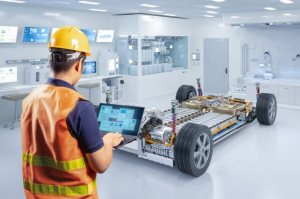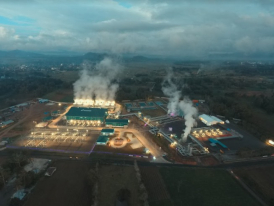Renewable energy development hampered by regulation and infrastructure: House
The government has set an ambitious target to develop new and renewable energy (EBT) capacity of 103 Gigawatts in the next 15 years despite the realization of this target is hampered by the absence of regulations and supporting ecosystems.
Deputy Chairman of Energy and Investment Commission VII of the House of Representatives (DPR), Sugeng Suparwoto, highlighted that until now the New and Renewable Energy Law has not been passed. In fact, according to him, the regulation is very important to provide legal certainty and a business ecosystem for the development of renewable energy.
"I am responsible as chairman of the energy commission, but the creation of laws is a shared responsibility between the House and the government. Ironically, the party that does not support the acceleration of the formation of this law is the government," Sugeng said in a webinar organized by Portonews magazine, on Wednesday, December 18, 2024.
He added that Indonesia's commitment to have this law before the 2022 G20 Summit in Bali, which carries the theme of energy transition, has not been realized until now. In addition, the National Energy Policy (KEN) that has been ratified by the House of Representative has not yet been signed by the government, so its implementation has been delayed.
The target for developing renewable energy of 103 GW has also not been integrated into the General Plan for Electricity Supply (RUPTL). Sugeng cited that without this integration, this target will only be a pipe dream.
According to him, one of the potential projects to be developed is the Wind Power Plant (PLTB). With a capacity factor of 42 percent, PLTB can operate for 24 hours with an investment cost of around US$2 million per megawatt. However, to achieve the target of 103 GW, an investment of US$235 billion or equivalent to Rp3,690 trillion is needed in 15 years, or around US$15 billion per year.
"This is our homework. If basic things such as regulations and infrastructure have not been completed, an investment of that size is difficult to realize," Sugeng said.
In addition to large investments, the development of renewable energy also requires technical infrastructure, such as smart grids, to integrate renewable energy spread across various regions, including Mamberamo, Papua (20 GW) and North Kalimantan (15 GW).
"We have decided to build a smart grid since 2021, but until now its implementation is still not clear," he said.
PLN monopoly
Sugeng also highlighted the monopoly by State power utility (PLN) in the electricity sector which is considered to be an obstacle to innovation and investment. As a solution, he said, the concept of power wheeling or leasing of electricity networks is proposed in the EBT law, allowing other operators to participate in providing electricity.
Sugeng emphasized the importance of real measure to realize the EBT target. In addition to regulations, there needs to be better coordination between the House of Representative, the government, and industry players to create a conducive investment ecosystem.
"With a target of 103 GW, we must immediately complete the basic requirements such as regulations, infrastructure, and supporting systems. Otherwise, this target will only be a mere discourse," Sugeng concluded.
Already have an account? Sign In
-
Start reading
Freemium
-
Monthly Subscription
30% OFF$26.03
$37.19/MonthCancel anytime
This offer is open to all new subscribers!
Subscribe now -
Yearly Subscription
33% OFF$228.13
$340.5/YearCancel anytime
This offer is open to all new subscribers!
Subscribe now






